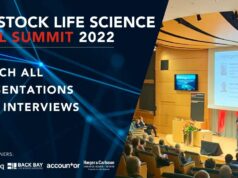
Sprint Bioscience launches NIMA at BIO International
It has been a little more than six months since Huddinge-based Sprint Bioscience announced its latest development project NIMA. Now the company chooses to shed some more light on the program, revealing the the target protein. The official launch will be at BIO International, which this year will be held in San Diego June 13-16. BioStock contacted Martin Andersson, CSO at Sprint Bioscience, to find out more.
Sprint Bioscience focuses on the development of preclinical drug projects targeting the treatment of cancer. The goal is to achieve out-licensing in the projects already in the preclinical phase, where partners take over and pay for the development until a possible approval.
Advances positions
Following last year’s rights issue and licensing agreement with American Deciphera Pharmaceuticals, Sprint Bioscience has advanced its positions and increased the pace in its development. The idea is that the higher pace will generate more programs and, in the long run, more license deals. The company previously communicated that it has the capacity to add one new program each year to its internal pipeline and last fall saw the addition of the NIMA program.
All the company’s drug candidates target and inhibit proteins that in one way or another have a role to play in various types of cancer. In the case of NIMA, the time has come for the unveiling of the protein that the company is targeting.
Reprogramming the microenvironment
Nicotinamide N-methyl transferase (NNMT) is a protein found naturally in fat cells and in the liver and that´s involved in the body’s metabolic regulation. The protein is involved in several processes that play an important role in the survival of cancer cells, where high levels have been shown to lead to epigenetic reprogramming in the cancerous tumor, that is, the reading of the cells’ DNA changes.
This has been shown to favor tumor growth, and also contributes to the secretion of a substance that inactivates the function of immune cells in the tumor. It has also been shown that the secreted substance affects the ability of CAR-T cells to kill tumor cells, which according to the company points to an opportunity to combine NNMT inhibitors with CAR-T treatments.
Potential in glioblastoma and gastric cancer
Among the cancer indications identified as particularly relevant within the NIMA program, we find gastric cancer, ovarian cancer and glioblastoma, where overexpression of NNMT has been shown to be associated with poorer survival. Above all, glioblastoma and gastric cancer are highlighted as particularly interesting indications to explore – both with large patient bases and poor overall survival.
Launched at BIO International
With the unveiling of the target protein, the time has come to launch the NIMA program, which will be done at the BIO International partnering meeting on June 13 – 16 in San Diego, USA. BioStock contacted Sprint Bioscience’s CSO Martin Andersson to find out more.

You have come far enough in NIMA to reveal the target protein. What makes you ready to reveal it now?
– To start business discussions, we need to be able to name the target protein. We have now reached a point where we feel confident in our position, so that potential partners choose to collaborate with us rather than try to start their own program.
What is the strategy for promoting the program?
– Given that we have succeeded in out-licensing the projects we have started so far, we see no reason to change our concept, which largely consists of going to partnering meetings and presenting the project to our network in the global pharmaceutical industry.
In addition to its role in cancer, the NNMT protein has also been shown to play a role in insulin sensitivity. Is there a possibility that in the future the program could also be directed towards the treatment of diabetes?
– We will focus on our specialty, which is oncology, but if a partner wants to expand with other indications as well, there is definitely a possibility of that.
This is the first time since the pandemic hit that BIO International is being held live. What are your expectations for the convention this year?
– There are many in the industry who are very eager to meet ‘in real life’. There’s a lot of interest in licensing programs, so I expect there to be a lot of delegates at the conference, especially from the United States.
The content of BioStock’s news and analyses is independent but the work of BioStock is to a certain degree financed by life science companies. The above article concerns a company from which BioStock has received financing.

